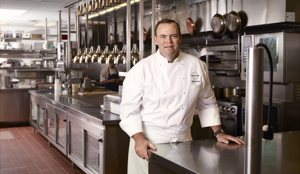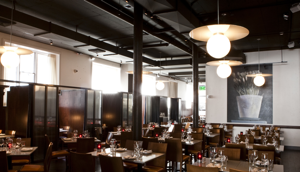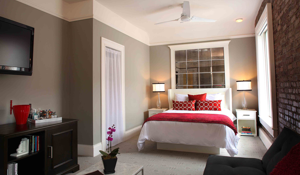
Chef Charlie Palmer may still be best known for his many acclaimed restaurants — Aureole in New York City and Las Vegas, Charlie Palmer at the Joule in Dallas and Charlie Palmer Steak in Las Vegas and Reno, Nevada, to name just a few — but he is working to his expand his presence in the hotel industry. A partner in Hotel Healdsburg in Healdsburg, California, since 2001, Palmer recently purchased San Francisco’s former Crescent Hotel in partnership with San Francisco-based City-Core Development and rebranded it as the Mystic Hotel. After investing approximately US$4 million in the 80-room property, which is located near San Francisco’s Union Square, Chinatown and financial district, Palmer said the hotel is performing well, maintaining 83% occupancy even during its transition to becoming the Mystic.
HOTELS recently spoke with Palmer about his plans for the Mystic, his stalled hotel project in Las Vegas and where he wants to be in the hotel industry going forward.
HOTELS: I’ve read that the Mystic Hotel in San Francisco was planned as a “chef-driven boutique hotel.” What does this mean?
Charlie Palmer: It’s really simple in the fact that the hotel and the restaurant are one. People staying in the hotel have a great restaurant to eat in, an amazing bar to have a cocktail in, and I think that completes the hotel experience in a lot of ways. We try to do what I call independent restaurants that just happen to be in the hotel. One of the really important things about a hotel like this that’s in San Francisco — or any city, for that matter — is that there are not just hotel guests in the restaurant. There are San Franciscans eating there. There are all walks of life. It really gives hotel guests, especially if they’re from other parts of the world, an experience of San Francisco.

HOTELS: What else would you highlight about the broad vision for this property?
Palmer: The Mystic is positioned as a 3.5-star hotel. I think that’s the perfect mark right now in the climate in a lot of major cities right now, but especially San Francisco. It’s not an expensive hotel. Our idea is to give a very good experience, but not a crazy rate. Our ADR is in the US$150 to US$160 range. It’s a hotel people can afford to stay in. It’s really young yet, but we’re finding that a lot of people are staying in this hotel for long stays — four, five, six nights. Another thing that makes it nice: it’s a mix in the hotel of businesspeople and tourists. It gives it a nice dynamic.
We took the property and really put some tender loving care into things. I think the biggest thing we added is service. We have a really welcoming staff, people who are passionate about food and wine, and that relates to the hotel, too.
HOTELS: Why did you decide to expand your hotel portfolio now?
Palmer: The Mystic came about with our delay in Las Vegas. Out intention was to build the Charlie Palmer Hotel in Las Vegas, and with the downturn and the location where we are in Las Vegas, it became obvious to us it was going to be a while before we can actually do it. We’re seeing some progress, and things are looking better, but it’s going to be a while before that economic climate changes enough where we can say let’s start building.
In the meantime, our plan turned to looking for under-valued, under-utilized properties, and San Francisco was one of our many target cities. San Francisco is a very good market and on the upswing. There are a lot of smaller, independent, boutique properties in San Francisco because of the makeup of the city.
Our intention is to do a number of these. We’re looking for existing construction, but they don’t have to be hotels. We have not only another possibility in San Francisco we’re very close to, but also in other cities like Seattle and Portland, Oregon, where we’ve looked at a couple different opportunities. When that will happen, we don’t know. I think there are a lot of properties that could be a lot of better, especially from a food and beverage standpoint.

HOTELS: I’m sure you’re very hands-on with F&B in your hotels, but how much involvement do you expect to have in a project like the Mystic Hotel beyond the property’s restaurant and bar?
Palmer: [Mystic Hotel General Manager] Kevin Dimond has 14 years experience. We have another person in our group who has 12 years experience with Starwood. We have hotel people, but I want to look at the hotel experience from a fresh point of view — as we do as restaurateurs, really looking at the hospitality approach to it. I know people talk about hotels as hospitality, but I think in a restaurant there’s a much more personal relationship that happens with clientele. If we can introduce that to the hotel guest in a seamless experience, if you can give people that sense of whatever you need we’re going to take care of it for you, like in a restaurant experience, I think that’s somewhat unique. That’s what our approach, in a very simple way, is. It’s about hospitality. It’s about how to make people happy.
HOTELS: I’ve read that “progressive American cooking” is your hallmark. How has that concept evolved?
Palmer: I term it progressive because it’s always changing. One of the great things about cooking in this country is there’s just an endless creativity that we’re all attuned to. I think the number one thing that drives us as cooks in this country to be better at what we do is ingredients. As ingredients get better, there’s no doubt our cooking gets better. Years ago, you couldn’t get dry sea scallops, for instance. Every sea scallop that came out of the ocean was put into a solution and processed. Now that almost unheard of at our level of cooking. Technology has obviously been a big help with that — getting sea scallops from Maine to California, for instance, in a matter of hours have changed a lot. The result is the diner is getting much better-quality ingredients. As cooks, it’s just our job not to screw it up.
HOTELS: Five years from now, where would you like to be in terms of your hotel projects?
Palmer: My wish would be that we have in five years another two, maybe three, properties, and hopefully by then we’re building in Las Vegas.
I’d like to be known as a very unique hotel group that’s really concentrating on food and beverage and bringing an experience to our hotels that doesn’t exist, or doesn’t exist at our level. There’s a lot of room out there for that.
